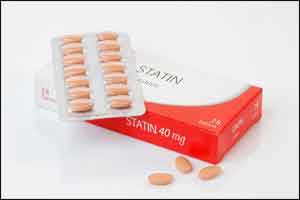- Home
- Editorial
- News
- Practice Guidelines
- Anesthesiology Guidelines
- Cancer Guidelines
- Cardiac Sciences Guidelines
- Critical Care Guidelines
- Dentistry Guidelines
- Dermatology Guidelines
- Diabetes and Endo Guidelines
- Diagnostics Guidelines
- ENT Guidelines
- Featured Practice Guidelines
- Gastroenterology Guidelines
- Geriatrics Guidelines
- Medicine Guidelines
- Nephrology Guidelines
- Neurosciences Guidelines
- Obs and Gynae Guidelines
- Ophthalmology Guidelines
- Orthopaedics Guidelines
- Paediatrics Guidelines
- Psychiatry Guidelines
- Pulmonology Guidelines
- Radiology Guidelines
- Surgery Guidelines
- Urology Guidelines
Why eligible patients don't take Statins as prescribed?

Despite a proven role of Statins in secondary prevention of cardiovascular diseases and also national guidelines supporting the same, more than half of eligible patients don't take them.
Why eligible patients don't take Statins is a question to ponder on. According to a new study ,two important factors have emerged and they are Lack of guidance by Physicians and fear of developing side effects.
Knowing fully well that the statins can lower risk of heart attack and stroke, many patients who could benefit do not take them. More than half of eligible patients say they were never offered the cholesterol-lowering drugs; the experience of side effects or fear of side effects were reasons for stopping or refusing statins, according to new research in Journal of the American Heart Association, the Open Access Journal of the American Heart Association/American Stroke Association.
Statins lower the amount of low-density lipoprotein (LDL, or "bad" cholesterol) and have been shown to lower the risk of heart attack and strokes. Because statins are proven effective and have a low risk of side effects, guidelines from the American Heart Association/American College of Cardiology recommend doctors use an atherosclerotic and cardiovascular disease risk calculator to give a detailed assessment of a person's 10-year risk for heart disease and to help create a personalized plan.
"We need to focus our efforts on improving how doctors identify patients who need to be on a statin, and how they present information to patients to ensure that no one is missing the opportunity to improve their heart health," said Corey Bradley, M.D., lead author of the study and a researcher at the Duke Clinical Research Institute in Durham, North Carolina.
To find out whether eligible patients use statins, and why they sometimes decline or discontinue the drugs, researchers surveyed 5,693 adults (average age 68) who participated in a registry for those receiving medical care at a cardiology, primary care, or endocrinology practice.
Researchers found:
- Of the 1,511 (26.5 percent) who were not currently taking statins, 59.2 percent reported that they had never been offered them.
- Patients were more likely to report never being offered a statin if they were female (22 percent higher than others), black (48 percent higher than others), or without insurance (38 percent higher than others).
- Patients seen in cardiology practices were more likely to be offered a statin than those in primary care.
"It is possible that some people did not remember being offered a statin, so we may have over-estimated the percent who were never offered one. However, we believe that if the patient did not remember the conversation, the discussion likely was not an effective one," Bradley said.
Of the patients who declined (10.1 percent) or discontinued (30.7 percent) statins, the most common reasons given were a fear of side effects and perceived side effects. Compared with statin users, non-users were less likely to believe statins are safe.
"Although there are risks associated with statins, the public fear of side effects is out of proportion to the actual risks," said Ann Marie Navar, M.D., Ph.D., senior author of the study and assistant professor of Medicine at the Duke Clinical Research Institute. "Misconceptions about statins are everywhere and are fueled by false information on the internet. We need better tools to help combat this type of misinformation."
Despite their concerns, in the survey 59.7 percent of patients who discontinued a statin would consider retrying it.
"Physicians should not hesitate to re-approach the conversation about starting or re-trying statin therapy in patients who could benefit but are currently not on the therapy," Bradley said.

Disclaimer: This site is primarily intended for healthcare professionals. Any content/information on this website does not replace the advice of medical and/or health professionals and should not be construed as medical/diagnostic advice/endorsement or prescription. Use of this site is subject to our terms of use, privacy policy, advertisement policy. © 2020 Minerva Medical Treatment Pvt Ltd